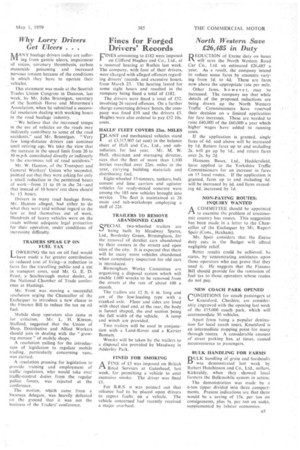Why Lorry Drivers Get Ulcers . . .
Page 37

If you've noticed an error in this article please click here to report it so we can fix it.
MANY haulage drivers today are suffering from gastric ulcers, impairment of vision, coronary thrombosis, carbon monoxide poisoning and increased nervous tension because of the conditions in which they have to operate their vehicles.
This statement was made at the Scottish Trades Union Congress in Dunoon, last week, by Mr. John Brannigan, secretary of the Scottish Horse and Motormen's Association, when he submitted a successful resolution dealing with working hours in the road haulage industry. , We believe that the increased tempo in the use of vehicles on the roads may indirectly contribute to some of the road accidents," said Mr. Brannigan. "Very few long-distance drivers can continue until retiring age. We take the view that the increase in the speed limit from 20 to 30 m.p.h. contributed directly or indirectly to the enormous toll of road accidents."
Mr. W. Hanton, of the Transport and General Workers' Union who seconded, pointed out that they were asking for only a small reduction in the permitted hours of work—from .11 to 10 in the 24—and that instead of 10 hours' rest there should be 13 hours.
Drivers in many road haulage firms, Mr. Hanton alleged, had either to do what they were told without regard to the law or find themselves out of work. Hundreds of heavy vehicles were on the roads without adequate legal protection for their operation, under conditions of increasing difficulty.
TRADERS SPEAK UP ON FUEL TAX
LOWER1NG the tax on oil fuel would .1—a have made a far, greater contribution to reduced cost of living—a reduction in fares for the travelling public,and a cut in transport costs, said Mr. G. .E.D. Frost, a Scarborough motor dealer, at the National Chamber of Trade conference at Hastings.
Mr. Frost was moving a successful resolution urging the Chancellor of the Exchequer to introduce a new clause in the Finance Bill to reduce the tax on oil fuel.
Mobile shop operators also came in for criticism. Mr. L. H. Kinson, Stafford, suggested that the Union of Shop, Distributive and Allied Workers should join in dealing with the "growing menace" of mobile shops.
A resolution calling for the introduction of legislation to regulate mobile trading, particularly concerning vans, was carried.
A resolution pressing for legislation to provide training and employment of traffic regulators, who would take over traffic-control duties from the regular police forces, was rejected at the conference.
The motion, which came from a Swansea delegate, was heavily defeated on the ground that it was not the business of the Traders' conference.




































































































